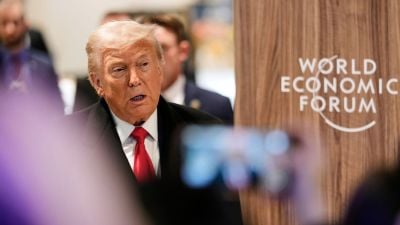Awaiting Emperor Bush
A wit recently remarked that America has still to learn from Britain8217;s long experience in ruling over a quarter of the earth8217;s lan...

A wit recently remarked that America has still to learn from Britain8217;s long experience in ruling over a quarter of the earth8217;s land and people. As it goes about establishing its imperial order, first fighting a war in Afghanistan and now invading Iraq, just stop for a thought experiment. How would Britain, during its age of empire, have dealt with adversaries like Osama bin Laden and Saddam Hussein? Played them off against each other, of course, and then sent in a few thousand troops to swoop in and occupy Afghanistan and Iraq to keep the peace and instruct the natives in the fine arts of fiscal management and parliamentary democracy.
Niall Ferguson, a professor of political and financial history at Oxford, has a more robust thesis. Empire is suddenly a worthy pursuit 8212; both as governmental enterprise and subject of revisionist history 8212; and Ferguson is its most versatile advocate. Having completed a television series on the subject, he has now transcribed his thoughts and research into a lavish book. Threading history, literature and trivia, he lists the great, lasting benefits of Britain8217;s colonial exertions: the triumph of capitalism as the optimal system of economic organisation; the Anglicisation of North America and Australasia; the internationalisation of the English language; the survival of parliamentary institutions 8220;which far worse empires were poised to extinguish in the 1940s8221;.
Yes, he concedes, there were the odd blots. Britain8217;s reliance on slaves in its it colonies is well documented; but there was a change of heart and resolve later, wasn8217;t there, with British forces patrolling the seas to curb the practice? Duplicity and exploitation were encoded in its skillful annexation of territories in the subcontinent and elsewhere, he appears to concede 8212; the imperial response to any challenge to British authority was brutal, he actually concedes 8212; but just survey the returns. India 8212; and other colonies 8212; got intensive instruction in administration, in running public schools, in locating hill stations. And in prettying their cities, he insists in a fit of petulance: 8220;Without the British Empire, there would be no Calcutta, no Bombay, no Madras. Indians may rename them as many times as they like, but they remain cities founded and built by the British.8221;
Before you sniff, well, thanks but no thanks, Ferguson asks you to indulge him by taking part in another thought experiment. Would New Delhi have its leafy roundabouts if the Mughal Empire had been gloriously restored in 1857? Would the energy of lower Manhattan have still been palpable if the Dutch had not given up New Amsterdam in 1664? Would large, colourful swathes of India have escaped a solid whitewash, a la Pondicherry, if France had won the Seven Years War?
That8217;s the trouble with these apologists for empire. Their alternative to empire is always yet another empire. This conviction leads Ferguson to make a most contentious assertion: that Britain withdrew from its imperial project in the 1940s in an altruistic endeavour to spare the rest of the world the cruelties of other, less benign, empires in expansionist mode: Russian, Japanese, German and Italian. The British empire, he says, could easily have negotiated a peace with Hitler and kept its colonies; instead it put all its imperial possessions on the line to wage battle against these oppressive empires. 8220;Did not that sacrifice alone expunge all the Empire8217;s other sins?8221; he pleads.
Well, thanks once again, but no thanks, that8217;s too pat. Just last month, for instance, Christopher Hitchens undertook a literary tour through Britain8217;s erstwhile colonies and everywhere found simmering remains of empire8217;s 8220;divide and quit8221; policy. Ferguson perhaps should be sent on another tour, this time through lands hurriedly partitioned.
This lesson in how not to administer is certainly not academic, because in his concluding chapter Ferguson makes a case for new empire for a new century: an American empire. A century after Rudyard Kipling, poet of empire, beseeched the US to 8220;take up the White Man8217;s Burden/ send forth the best ye breed/ go bind your sons in exile/ to serve your captives8217; need8221;, he says the time has come for this old colony to establish its own. He invokes Dean Acheson8217;s famous 1962 line 8212; 8220;Great Britain has lost an empire and has not yet found a role8221; 8212; to make the point that America has inherited Britain8217;s old role without wisening up to the fact that an empire comes attached.
America, he admits, is not a natural 8220;imperial hegemon8221;. First, because unlike the British empire, it is a net importer of capital and people. Two, because, being Britain8217;s first colony to wrest freedom, it is a 8220;reluctant ruler of other peoples8221;. So, he says, its approach has so far been 8220;to fire some shells, march in, hold elections and then get the hell out8221;.
Iraq and Afghanistan 8212; and others on the Pentagon8217;s laundry list of hotspots deemed worthy of intervention 8212; will definitely test the hyperpower8217;s staying power. But more importantly, as Washington finalises interim, pro-America dispensations in these countries, it may find that most observers will be far less dewy-eyed than the Oxford don.
- 01
- 02
- 03
- 04
- 05































